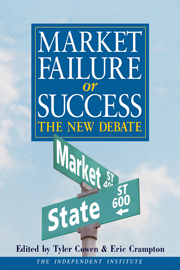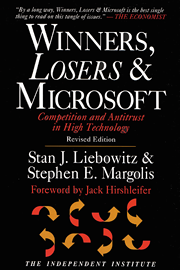Judge Penfield Jackson’s Findings of Fact is interesting reading. But at its core, his findings of fact rely on an economic fiction.
I refer to what the Judge calls the “intractable chicken-and-egg problem,” otherwise known as the theory of lock-in. Lock-in theory says that a dominant product might remain entrenched in the face of a superior rival product because the rival cannot coordinate consumers (and producers of complementary goods).
The lock-in story goes like this: Assume that Beta videorecorders are superior to VHS videorecorders and that everyone would like to switch to Beta. VHS, however, is already well established, and all movies are recorded in the VHS format. Clearly, if the everyone switched to Beta, movies would then be released in Beta format. But, it is conceivable that everyone might think that everyone else is going to purchase VHS, and therefore that they must purchase VHS if they want to be able to rent movies. Since everyone prefers Beta, this would be a bad result. Of course, if someone could coordinate these consumers to make the switch the problem would be overcome. These coordinators are known as entrepreneurs in our economy, and they are always left out of lock-in stories.
Judge Jackson’s version of the software lock-in story is as follows. Even if everyone preferred OS/2, we all (including application programmers) might think that everyone else is going to stick with Windows, and so we choose Windows to get its large set of applications. He calls this an “application barrier to entry.” He believes that this barrier is the source of Microsoft’s monopoly power.
The judge doesn’t explain how Microsoft was able to overcame this barrier in the first place. After all, programmers wouldn’t have written programs without users, and there would be no users without programs. Yet Microsoft did overcome them. You might suppose that the same factors that allowed Microsoft’s operating system to flourish could work on behalf of a superior alternative, but the judge insists that no new entrant could overcome these factors. When Microsoft improves its operating system and supports third party software developers, normally thought to be commendable actions, they become tactics that wickedly strengthen this barrier according to the judge. The problem with all of this is that there are serious problems with the belief that the market cannot handle coordination problems. For one thing, this type of logic also implies that cars cannot exist, since there wouldn’t be any gas stations without cars and no cars without gas stations.
Similarly, consumers couldn’t have moved from records to CDs, eight tracks to cassettes, mail to fax machines, or any other of a host of examples. Even more to the point, there is not a whit of evidence to support this claimed coordination failure. Stephen Margolis and I have spent more than a decade investigating these coordination stories, and have recently written a book on the subject. Our conclusion, based on a mountain of evidence, is that the chicken/egg paradox does not provide a foundation for concerns that markets might not function properly. There is not a single known example where these coordination problems were not overcome-where superior entrants were not able to vanquish inferior incumbents. It certainly wasn’t true for typewriter keyboards or videorecorders, the two most cited supposed instances of lock-in. These turned out to be just poorly research fables. Interestingly, we found that market leaders in software markets were more likely to have their leads quickly taken over by superior challengers than was the case in other markets.
Judge Jackson provides the OS/2 and Macintosh stories to support his lock-in story. But these are just new fictions. The Judge ignores the fact that OS/2 started out with plenty of developers, was more expensive than Windows, required beefier computers, routinely crashed during installation, and didn’t work with many printers and video cards. The judge also seems unaware that OS/2 was planned to run only on IBM produced PCs, with a ‘lite’ version for other machines (imagine if Microsoft had tried this!). Nor should we forget the Macintosh’s high price, Apple’s unwillingness to port its operating system to other hardware, and its general disdain for the mass of PC users. The failure of these products to become the dominant operating system had nothing to do with coordination failures.
Those entrepreneurs, left out of lock-in stories, turn out to be pretty good at coordinating these markets. They do it, of course, to get rich. And a superior operating system that could replace Microsoft would certainly provide a rich payoff, as the owners of Red Hat which has faint hopes in those directions, have discovered. There seems no reason to think that entrepreneurs wouldn’t be up to this job in software markets, particularly given the enormous amounts of money flowing through the IPO coffers these days.
This ‘application barrier to entry’ is, therefore, just a beguiling chimera. When and if a better operating system comes along all the evidence indicates that it will get established. Windows has not been dislodged as yet only because a superior alternative has not made its presence felt. Maybe it will be Linux. Maybe it will be some currently unknown system. Or maybe it will remain Windows until the next computing revolution overtakes them all.










